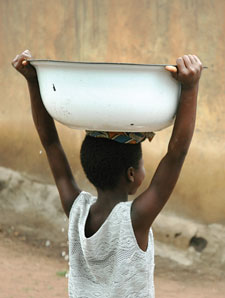Some images we see of life in Africa are heart wrenching, especially those coming out of Zimbabwe. The 21 September issue of the Church Times (published in London) carried a photo of a father from Bulawayo collecting water in a small pot for his four children. He's siphoning his water from a small puddle in drought-hardened dirt.
 The Zimbabwean Anglican dioceses are part of the Province of Central Africa. The Province includes Anglicans from Zimbabwe, Zambia, Malawi and Botswana. Their Primate, Archbishop Bernard Malango is due to retire in early 2008. In certain ways the Province seems to be in some disarray. After their recent Provincial Synod, held in Malawi, the Bishop of Harare, Norbert Kunonga accused the dioceses and bishops of the Province of failing to condemn homosexuality. He threatened to leave the Province, and there have been later reports of him declaring he would commence his own Province.
The Zimbabwean Anglican dioceses are part of the Province of Central Africa. The Province includes Anglicans from Zimbabwe, Zambia, Malawi and Botswana. Their Primate, Archbishop Bernard Malango is due to retire in early 2008. In certain ways the Province seems to be in some disarray. After their recent Provincial Synod, held in Malawi, the Bishop of Harare, Norbert Kunonga accused the dioceses and bishops of the Province of failing to condemn homosexuality. He threatened to leave the Province, and there have been later reports of him declaring he would commence his own Province.
The Central African Provincial Secretary issued a statement of clarification after Kunonga's published statements. He emphasized that the bishops of the Church of Central Africa adhere to the Lambeth Conference 1998 resolution 1.10, which states that homosexuality is not compatible with Scripture. The bishops also reaffirmed their commitment to the Anglican Communion "Windsor Process.' But there remains in some people's minds some doubt about the Province of Central Africa's stability.
Of course the Bishop of Harare is one of the non-invitees to the 2008 Lambeth Conference. He would be a headache for any primate. His lack of invitation has surprised no-one and no voice has been heard in protest. He is a noted sycophant of President Robert Mugabe whom reports say gave him a large commercially active farm for his unwavering support of the ZANU PF party. Many claim that Kunonga then arranged for party militia to evict 40 families of workers from their dwellings on the estate.
But what of Zimbabwe itself? It is under the sway of the rule of Robert Mugabe who took office in 1980 when the country gained independence. We Australians had a hand in his rise to power for he was strongly supported by former Prime Minister Malcolm Fraser. Today Zimbabwe is economically crippled. The inflation rate is 6,000 percent. Shortages of electricity, fuel and food are commonplace. The people are starving. There is little employment and many urban dwellers have no homes when since their dwellings were demolished by Mugabe.
Added to that is the present state of severe drought. One Bulawayo resident said, "Life has become a matter of queuing, another said. "At times fights break out over positions in the water queue, "she said. "As far as I can recall it has never been as bad as this."
One local council official told a UN worker "The situation is critical and as water levels deteriorate, residents will be getting water once in every eleven days, and we expect this to happen from the beginning of October."
Impatient residents have taken to digging shallow wells, but the lower levels of hygiene associated with this are heightening the risk of waterborne diseases.
One mother said the difficulty in obtaining water means her children leave for school without washing, as "regular bathing has become a luxury".
UNICEF reports that one in three children in Zimbabwe, 1.6 million, are now orphans who have lost at least one parent. One child reportedly dies of AIDS or is orphaned every 20 minutes, three infants are infected with the AIDS virus every hour and 1 in 8 children die before the age of 5. In the adult population the overall prevalence of HIV infection was 24.6% in 2003.
Life for the majority of Zimbabweans is almost unbearable, yet Mugabe has built himself a palatial retirement complex, funded by Chinese government money.
The silence of much of the international community is shameful. Remember the Latin proverb, which translated means "He who keeps silent apparently approves.'



























